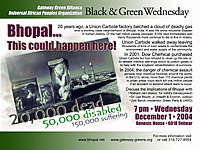VIEW
FLYER
8x11
PDF (187k)
CLICK
HERE
8x11
JPG (348k) CLICK
HERE
8x11
JPG (850k) 250dpi CLICK
HERE
PRINT
FLYER
8x11
PDF (1.2mb)
CLICK
HERE
Right-click
to download
8x11
JPG (2.4mb) CLICK
HERE
Right-click
to download
PRINT FLYER 5x8" 2-up
PDF (762k) CLICK HERE
COMPOST-DISPATCH
AD
5.5 x8.5"
PDF (920k) CLICK
HERE
PRINT
POSTER 24"x36"
PDF (903k) CLICK HERE
Sponsored by
Gateway
Green Alliance • Jobs
With Justice
Universal
African Peoples Organization
 |
Black
& Green Wednesday Forum |
WHEN: 7 pm, Wednesday, December 1, 2004
WHERE: Genesis House, 6018 Delmar, just east of Skinker
December 3 is the 20th anniversary of the deadly gas leak which became the worst industrial disaster in human history. You are invited to join Bhopal survivors in India through a Global Day of Action to expose Dow's corporate crimes, to hold them accountable, and to protest continued poisoning by chemical manufacturers worldwide.
The December 1 forum will be in solidarity with this growing movement, in recognition that the same sort of disaster could happen in St. Louis. Held at Genesis House, 6018 Delmar, the forum will feature:
|
|
Nishant Jain, Association for India's Development |
| Lee Blount, Jr., M.D., Health & Environmental Justice | |
|
|
Zaki Baruti, Green Party of St. Louis, Universal African People's Organization [moderator] |
On the nights of December 2 & 3, 1984, more than 27 tons of methyl isocyanate and other deadly gases were released from Union Carbide's pesticide factory in Bhopal. The plant's safety systems were poorly designed, and on the night of the disaster all six of them were either malfunctioning or under repair. The gas spread throughout many of the crowded, working-class neighborhoods of Bhopal.
Approximately half a million people were exposed to the gas and at least 20,000 died as a result. Among the 150,000 estimated to be suffering serious long-term health effects from exposure, at least 50,000 are too sick to work for a living. Recent studies have established health effects among children born to gas-affected people, confirming fears of trans-generational effects of the poison gases.
Thousands of tons of toxic wastes abandoned by Union Carbide in and around their Bhopal factory continue to contaminate the environment and leach poisons and cancer-causing chemicals into the groundwater sources supplying a community of 20,000 people.
In 2001, Michigan-based chemical corporation Dow Chemical purchased Union Carbide, thereby acquiring its assets and liabilities. However Dow Chemical has steadfastly refused to clean up the site, provide safe drinking water, compensate the victims, or disclose information about the health effects of the leaked gases, which doctors could use to properly treat the victims.
The case in Bhopal clearly shows the double standard to which US multi-national corporations operate abroad. There are thousands of "slow, silent Bhopals" that have left their mark on developing nations and low income communities of color, denying basic human rights to clean air, water and health.
Moreover, Dow and the chemical industry continue to manufacture products and release poisons into the environment that end up in our communities, our food and our bodies on a daily basis, at levels that place many of our children at risk. This chemical assault has been linked to life threatening diseases and ising rates of cancer, asthma, birth defects, and learning and behavioral disabilities in children.
Dow and the chemical industry have also polluted the political and regulatory process - preventing many laws that would protect communities, workers and families from toxic chemical threats. Dow has worked o weaken protective chemical policies in US and Europe and tried to weaken public health standards related to dioxin contamination, a major health threat often linked to Dow's production processes.
Twenty years later, the chemical industry is just as dangerous as it was at the time of the Bhopal disaster. Despite existing laws and regulations, in the United States alone, there are more than 110 chemical factories that could kill a million people in the event of an accident or a terrorist attack.
Sponsored by the Gateway Green Alliance, Universal African People's Organization and Jobs With Justice. For more information call 314-727-8554 or visit the Greens' web site:
To learn more about how you or your group can join in actions sponsored by the International Campaign for Justice in Bhopal (ICJB) and the Dow Accountability Network, visit the following links:
Bhopal.fm (radio)
New Book:
Trespass Against Us: 20 things to Know About Dow Chemical on the 20th Anniversary of BhopalReview ...an overdue new genre, the "corporate biography"
Last updated 26 November 2004. Contact: contact@gateway-greens.org.

